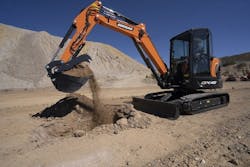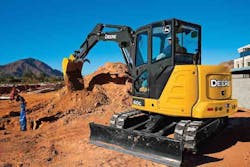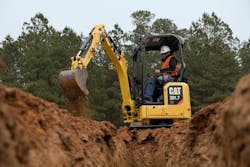When to Buy or Rent Mini Excavators
As machine features increased in complexity and versatility, utilization opportunities grew alongside them.
Fleet managers should analyze utilization needs before deciding to buy or rent a mini excavator. Contractors engaged in utility work, residential and commercial construction, road work, and municipalities are more likely to purchase excavators than rent, since those machines are guaranteed use over 50 percent of the time. Others will rent an excavator to complete a short-term task without the added maintenance and service costs.
Excavator rental trends
In North America, manufacturers have historically sold about 80 percent of their machines and rented 20 percent, according to Derek Betcher, marketing manager at John Deere. Renting fits for short-term jobs—especially if the future needs of the machine are unknown. It also works for a fixed job that has a defined task, or for a contractor who only occasionally uses a mini excavator. Renting can also help control costs by eliminating repair and maintenance responsibilities.
“There may not be a clear business need for that equipment after that job,” says Betcher. “After that project is done, it could be something totally mainstream for that business, where they know exactly what product they need and how long it’ll take. Or it could be a new niche where it makes sense to do it for only a month or for a certain project. Renting is great for that.”
Betcher also cites job bonding as a benefit to rental. Although there isn’t a “one-size-fits-all” solution to whether to rent or buy, the financial capacity of a business plays a part in the decision.
“Contractors need to maintain available assets to have strong bonding capacity, secure jobs, and bid on bigger jobs,” he says. “It’s better to have rental payments than to have cash in your business tied up in the fleet.
“Many places will rent to anyone with a credit card,” Betcher says. “If you’re going to rent it for the weekend, you just have to have $400 on your credit card. Whereas if you’re going to buy a $40,000 mini excavator, you’d have to have credit capacity, or the capacity to make the lender feel confident you’ll be able to pay the money back.”
Companies considering a new niche or taking advantage of another project opportunity can limit financial exposure by renting a mini excavator.
“An owner may have 10 owned excavators on three jobs, but has another job opportunity and doesn’t have enough equipment to cover all four jobs,” says Patrick Baker, product manager at Kubota. “The owner would rent a machine or two to complete the fourth job or until some of the owned equipment becomes available from completion of another project.”
For those exploring a new niche, “renting the equipment could be the low-risk way to ensure that’s the business model you want to grow into,” says Betcher.
When to rent to buy excavators
Rental also provides customers with a “try before you buy” opportunity, allowing rental to potentially lead into a machine purchase. According to Betcher, this can be attractive to many fleet managers.
“[A contractor] could be really familiar with one size of mini excavator or one brand,” he says. “Rental can give them [an opportunity] to decide if they want to add that product to their fleet.”
Another option is a rental purchase agreement. With an RPO, an equipment manager will apply a percentage of the cost to rent to the purchase of that machine.
“[Rental companies] don’t do it because their business model is to make a profit off of renting,” says Dave Donneral, sales manager at KOBELCO. “But when you rent from a dealer, they’re renting it to you to get the machine paid down, to get a cheaper machine to sell. If your rental rate is 3 percent of what the cost of the machine is, in theory, after 36 months it’s paid for.”
Rental companies usually provide mini excavators with basic specs—canopy/ROPs, dozer blade, rubber track—and no bells and whistles. And of course, they’re not for sale. A dealer may rent similarly spec’d mini excavators, but they also have the option of renting high-spec machines to cater to the percentage of people who hope to eventually buy.
“When somebody walks through the door and wants to buy a machine, they might not be in a position to purchase it,” says Greg Worley, senior product engineer at Caterpillar. “But we could have a multiple-price-point machine in the rental fleet with all the features they need on it, and then we sell them the rental piece. That way, it gives them multi-unit pricing depending on how many hours are on it.”
If a fleet manager is considering a rental purchase, they’ll usually rent a higher-spec’d machine that would fit well as a permanent fixture in their fleet.
“A customer will purchase a mini excavator with more specific features related to their operation,” says Sam Schneider, regional product manager for Takeuchi. “For example, those features might include a thumb, rotator, angle blade, etc. It’s also very evident, as with a lot of equipment, that most people choosing to buy are purchasing cab machines vs. open ROPS as operator comfort is becoming a greater factor.”
The dealer will also structure the rental differently with a rental purchase.
“Typically the deal is they get some of that rental rate back,” says Aaron Kleingartner, marketing manager for Doosan. “It’s usually not 100 percent, maybe it’s 85 percent back. Every dealer does this a bit differently, but in general, they get a majority of that rental rate put toward their purchase.
“When you do that, you obviously want a machine you’re willing to purchase long-term, so you’ll want to configure it differently—perhaps with a few more features that fit your exact needs.”
If a company is used to renting canopy machines, they may consider switching to an enclosed cab for better year-round utilization upon starting a rental purchase, for example.
“If I want to provide my operators with the comfort of air conditioning, I might get the enclosed cab and HVAC system,” Kleingartner says. “If I’m just going to rent it for a project, I might just rent that canopy version. The price points of those two machines are different. Using a short arm vs. long arm vs. extendable arm on some models also impacts the price of the machine. Whether or not you can use those features to your benefit is job-site dependent.”
Deere’s Betcher agrees that rental can play a significant role in determining whether or not to buy a machine. He cites the popularization of tracked skid steers as an example.
“In the last five years, tracked machines have taken over the larger share of the market,” he says. “I think rental helped fuel that. People may have had concerns about the durability of tracked machines—they weren’t sure if the productivity advantages were as awesome.
“But after running a machine for a season or a month or a weekend, and really trying it out before they bought it, that machine form just took off. I think renting to make sure the machine has the productivity you need to see on your job is a realistic thing for contractors to want.”
Kleingartner’s suggestion if contractors are interested in a rental purchase: be clear about wanting to go through the rent-to-own program from the start.
“If you might have a long-term need for the product, it’s definitely a requirement to talk about the RPO upfront,” he says. “Most RPOs are not retroactive, so you can’t be into it for six months and ask the dealer to buy it. It has to be structured like that from the beginning.”
Covid's effect on rental of excavators
The Covid-19 pandemic has skewed acquisition strategies for mini excavators, according to Betcher, as demand for equipment has spiked. In 2021 (and perhaps even beyond), he urges contractors to ensure availability before committing to either purchase or rental.
“[Because of the uptick], we’re seeing particular compact equipment demand, in some cases outstripping how fast manufacturers can produce it,” he says. “So when you consider whether to rent or buy—while this wouldn’t ordinarily be the first question you’d ask—I think this year, you first need to ask where you can get the machine.”
According to Darron Ashton, Volvo’s excavator product manager, the pandemic also weakened supply chains across the industry. Since various components are sourced from different places, customers may see delays or increased timelines of production.
“That can create demand as well, but not a good kind,” he says. “I think it has to deal a lot with lockdowns and the inability to work. If you have the guy who makes a certain widget and he has to shut down, the widgets aren’t getting built. They can’t go from producing 100 or 1,000 widgets a day, shut down for a week, and then push that backlog of 5,000 through in a day. It takes time.”
Fleets that already own mini excavators will be at an unexpected advantage.
“Purchasing equipment means you have the right machine at the time you need it,” says Jason Boerger, marketing manager at Bobcat. “You aren’t forced to use only what the rental center has on hand.”
For contractors on the search, Betcher suggests they ask their preferred dealer well in advance if the machine needed is available.
“[They need to ask] if the dealer is getting one soon that they can buy, or do they have a better chance of getting their hands on a rental to complete their project?” he says. “Even then, will the rental company have this machine in stock and ready to rent? I’ve heard many anecdotes this year from rental companies. They’ve had to turn away more rents—and suffered lost rents due to lack of product—than I’ve ever heard before.”
Although general construction remained steady in 2020, manufacturers say the do-it-yourself market “took off” in its place, helping the rental industry recover somewhat from the pandemic’s economic blow.
“People that were spending more time at home and less time on vacation or at the office began to make widespread improvements on their properties,” Betcher says.
Caterpillar’s Worley seconds this.
“A lot of people are working from home, and timber prices have gone through the roof—so people started doing a lot of construction work at home,” he says. “Early on, that was great.”
But the increased demand reduced inventory. Even into 2021, rental companies sold down their rental fleets to meet customer demand, believing they could replenish with new equipment. Rental-only companies who held onto their rental fleets have been fully booked in recent months.
“In order to do some of this at-home work, people are going to rental companies for machines or for equipment,” Worely says. “There’s actually less rental machines around at the moment.
“It’s a good and bad situation that Covid has created, and you can get examples in many different aspects of the construction and home industry. If they’re a rental house that hasn’t sold their equipment, they’re still golden.”


